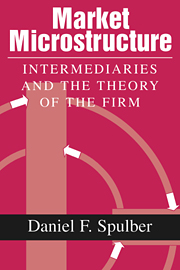Book contents
- Frontmatter
- Contents
- Preface and acknowledgments
- Introduction
- Part I Market microstructure and the intermediation theory of the firm
- Part II Competition and market equilibrium
- Part III Intermediation versus decentralized trade
- Part IV Intermediation under asymmetric information
- Part V Intermediation and transaction-cost theory
- Part VI Intermediation and agency theory
- 11 Agency and the organizational-incentive theory of the firm
- 12 Agency and the intermediation theory of the firm
- Conclusion
- References
- Index
12 - Agency and the intermediation theory of the firm
Published online by Cambridge University Press: 18 December 2009
- Frontmatter
- Contents
- Preface and acknowledgments
- Introduction
- Part I Market microstructure and the intermediation theory of the firm
- Part II Competition and market equilibrium
- Part III Intermediation versus decentralized trade
- Part IV Intermediation under asymmetric information
- Part V Intermediation and transaction-cost theory
- Part VI Intermediation and agency theory
- 11 Agency and the organizational-incentive theory of the firm
- 12 Agency and the intermediation theory of the firm
- Conclusion
- References
- Index
Summary
In Chapter 11,I reviewed models of delegation in which agents are producers and decision makers. In this chapter, I emphasize that the agency relationship frequently involves agents acting as market intermediaries. Agents enter into economic transactions with third parties on behalf of their principal. Acting for their principal, agents negotiate contract terms, carry out competitive strategies, and monitor performance. Thus agency provides a framework that helps to unite the divergent views of the firm as producer and as intermediary.
The distinction between the theory of agents as producers and agents as intermediaries is roughly analogous to the difference between decision theory and game theory. Decision theory is a game against nature while game theory takes strategic interaction between players into account. Similarly, agents as producers choose effort levels or make decisions, while agents as intermediaries interact with other principals or other agents. Strategic interaction provides a more complicated and perhaps a more accurate picture of what agents do.
Viewing agents as market intermediaries has important implications for the intermediation theory of the firm, both in terms of the organization of firms and the economic role of firms. As I mentioned in Chapter 11, the organizational-incentive view centers on agency relationships within the firm, emphasizing the design of incentives for effort and revelation of information. Viewing agents as intermediaries, in contrast, focuses attention on how the firm acts in the market through its employees (and independent agents). Thus directors act for the firm in the market for corporate control and in the labor market for executives.
- Type
- Chapter
- Information
- Market MicrostructureIntermediaries and the Theory of the Firm, pp. 319 - 343Publisher: Cambridge University PressPrint publication year: 1999



